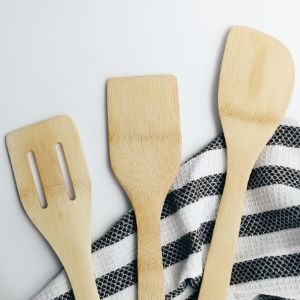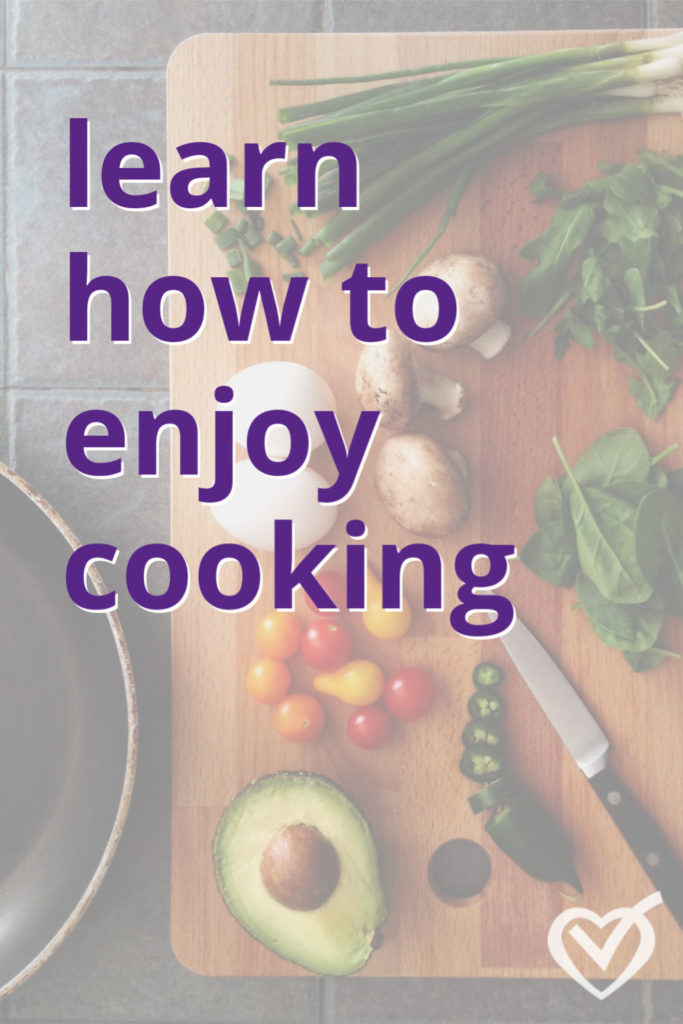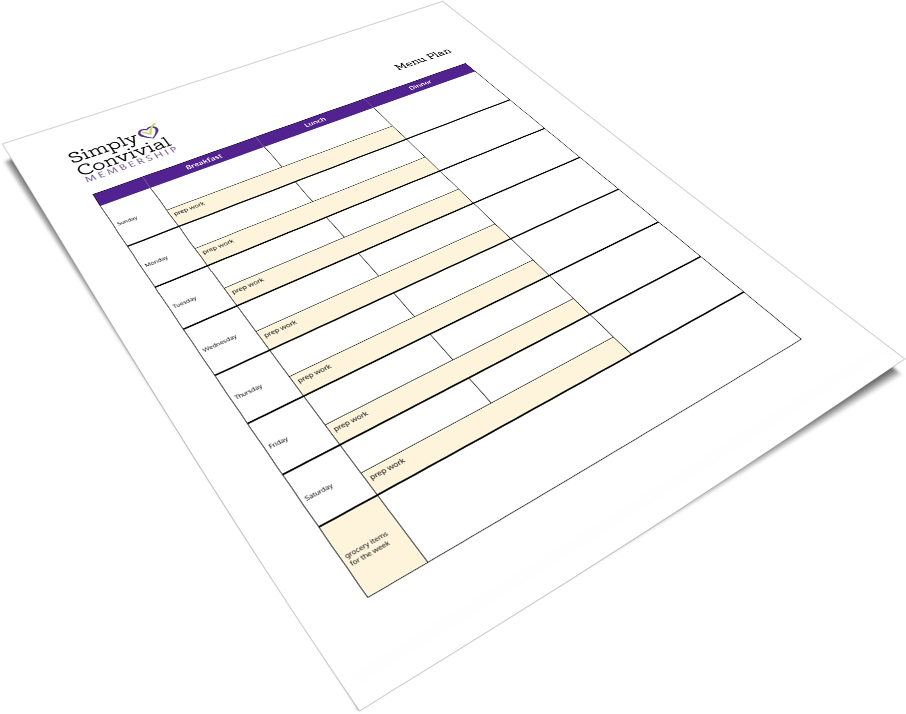
It’s easy to slip into feeling like dinner is a drag, like it’s an interruption, like it’s something we just really rather not do. But since we do need to serve dinner everyday, why not learn how to enjoy cooking more? It truly is possible!
Of course, there are times where it just doesn’t happen or it doesn’t work out or we don’t have the time, and so we have plan B meals. We have takeout—there’s pizza (whatever) sometimes that happens. But as a general rule if we are walking into the kitchen and feeling downcast and downtrodden because we have to fix another meal it’s really not the kitchen work that has to change or a new plan we have to make unless that plan is about our attitude.
Today I have three tips to help us learn how to enjoy cooking more:
- Plan and reserve enough time to make dinner without rushing.
- Intentionally cultivate and practice cooking skills.
- Understand that cooking is relational and meaningful.

We need a plan to fix our attitude, not a plan for fixing dinner. We’ve got to fix dinner. We have to fix our attitude first and even while we fix dinner. And when we can repent of our bad attitudes about our responsibility to feed our people we will find not just that we dread making dinner less, or we are resent the obligation on our day, or the mess in our kitchen that dinner makes, instead of looking at all those things as impositions on us, we can take it in stride as a part of our responsibility and duty and not just do it out of drudgery, but actually enjoy it.
And there are three reasons and three ways that we can grow in our enjoyment of this work. But we have to be prepared to give up the bad attitude.
To recognize our thought patterns about dinner and about our work and be willing to reject telling ourselves a bad, negative story about our work and be willing to turn that around and look at what is good and beautiful and true and wonderful about our work because it is there.
We need to reject the falsehood and choose to think the truth. And that’s the basis for organizing our attitudes which is always the first step of actually getting organized—putting our attitude in its proper place, oriented towards truth and joy. It’s a responsibility and we can grow in it.
Enjoy cooking by giving yourself enough time.
So, one of the first ways that we can learn to enjoy making dinner is to mentally and actually (maybe even on our calendars) block out the time that is required. A lot of times dinner might feel like an imposition or we resent having to go make it simply because we haven’t budgeted the proper amount of time that it does take. And so, in thinking that somehow dinner is just going to magically happen, or losing track of time, and then dinner is a surprise, these are all things that drag us down in making dinner, but it’s really improper time management on our own part. It has nothing to do with dinner really but in the way that we’re thinking about time and our responsibilities.
So we need to look at our day, every single day, and weekly during weekly review. And reserve enough time to put dinner together regularly every single day; to have a plan. Maybe we need to have a leftovers day or a takeout day, but no matter what, we have looked at our day and figured out how much time we have and how much time we do need to give to feeding our people. It does take time. And unless we reserve that time, budget it, think about it, then it’s always going to feel like a surprise and an imposition because it catches us off guard. And it really shouldn’t because it’s happening every day.
Let’s plan for the time that it takes and once we recognize and reserve that time we can enjoy making dinner more because there’s room enough in our day, room enough in our mindset about how we’re spending our day and our energy, and so instead of feeling like an interruption, like we are cramped for time, we recognize that we are doing the right thing in the right time and that allows for us to enjoy the work there because we are faithfully doing what we ought to be doing.
We aren’t distracted by feeling pulled in multiple directions because we’re able to focus in on doing what we are supposed to be doing—the right work, at the right time. And dinner needs to be a part of how we have decided to spend our time. When that time is reserved we are enabled to do the work and actually enjoy it.
Practice increases enjoyment.
The second thing that we need to do when we want to learn how to enjoy cooking more is to consciously and intentionally improve our skills in cooking dinner. And that takes focus, that takes intentionality. It takes a plan. And it also is incremental. Cooking is a set of skills that we never willfully master. So, we aren’t looking to become the most accomplished chef in the world and to put gourmet dinners on the table.
Our goal is to get better at what we’re doing. And when we are learning and growing, trying new things and improving, making progress and skills, that’s inherently enjoyable and satisfying. And so, if we can just find a few small key areas that we want to grow in, not just cooking generally because that’s too big, we need to narrow it down and say, “I want to figure out how to make my crock pot meals not burn.” That can be all it is.
I want to figure out how to use the instant pot. I want to learn how to make soup without a recipe. When we narrow it down and choose a small little skill to learn and we make progress in it, we learn new things about ourselves, about the world, about science, about food, and that’s satisfying. And so we find that we enjoy cooking more because we are using it as another avenue to learn and grow.
Cooking as a way to love and enjoy people.
The third and most important way that we can learn to enjoy cooking more is to see cooking as relational. A lot of times when we think about needing to enjoy life or wanting a break, feeling overwhelmed, we think the solution is to go off by ourselves and do something that is only personally enjoyable, and forget about serving other people, or thinking about other people’s needs, I’m just going to do what I like doing and that would be refreshing.
That’s a lie. It’s a lie that will feed your frustration and your despair and your dread of the kitchen work. It’s just not true. It’s not the way the world works. It’s not the way humans work. You will find more enjoyment in life, and even in cooking in particular, when you see it as relational, which it is inherently, and revel in that, lean into that.
When we make human to human connections, when we express love and receive love, we feel satisfied and refreshed and enjoy life. And cooking is just one small, practical, tangible way to do that. The food doesn’t need to be cooked inherently for itself and it’s not something that is always a personally satisfying hobby. It can be, but we don’t have to make it that to have the satisfaction of providing a warm meal that fills our family’s tummies and helps them grow, be healthy, and experience the security and stability and love of a nurturing family.
Dinner is such an important part of our family culture and our family experience that it is well worth the time that we put into it. And when we see it for what it is—a way that we can love and connect with our families then we enjoy doing it more because we feel the enjoyment and satisfaction of human connection and service and love. And we also see that the cooking is serving a bigger picture, one of our bigger life goals, which is connection with our family loving our family. Dinner is practical. Dinner is a necessity, but it’s not mundane and tedious unless we turn it into that with our mindset and our attitude.
Dinner also allows for creative scope with material and that’s personally satisfying but it also provides the basis for family and friendship connections over food. There is something inherently relational about sharing a meal together. It builds our relationships in a way that really nothing else can. And so our cooking is providing the canvas, the setting for those relationships to be formed and deepened. And that’s something that we can enjoy.
We can think about that while we are cooking and then we can enjoy the after effects while we’re cleaning it up and preparing to do it again. Yes, we will have to make dinner over and over again. But that means that we are able to sit around the table and enjoy each other’s company again and again with the excuse of enjoying a meal together. Let’s think about that next time we want to escape the kitchen. Let’s make sure that we block out that time. That we grow in our skills and ability. And that we remember that it’s really about relationships, connections, the experience of sharing a meal together with our family.
Thus we can grow in our enjoyment of cooking. All this month we are talking about kitchen tips. So, make sure and check out the playlist for how to simplify your kitchen.
Keep learning about kitchen organization skills:
This menu plan template and master pantry resource will help streamline your kitchen.


The best thing I ever did for cooking dinner was to enlist my 3 kids to prepare one meal a week, which they choose. Then, instead of my attitude being that I am an unappreciated servant, I get to be a teacher helping my kids learn independence (I am a math teacher by vocation). Depending on the meal they cook more or less (some meals are complicated, the youngest is 13 and oldest is 18). But I am in the kitchen assisting and helping to plan, tidying as we go, and that feels great!
Yes! That’s a great tip. :)
Thank you for the reset, Mystie! I needed the gentle reminder to cherish this time around the dinner table with my family by making the whole process a priority rather than a chore. Blessings to you as you continue to share wisdom and encouragement!